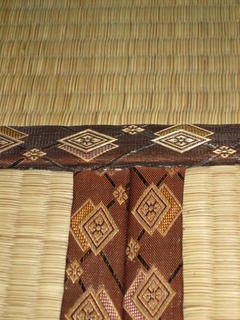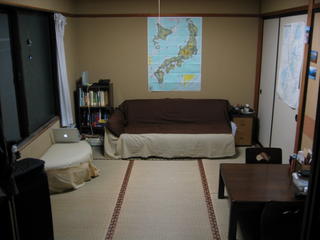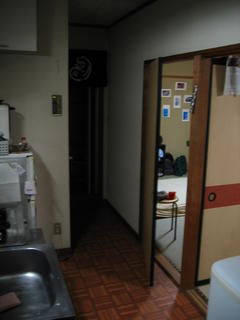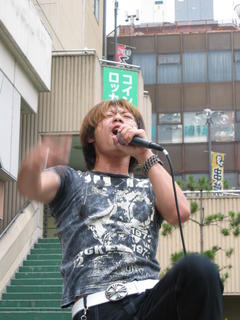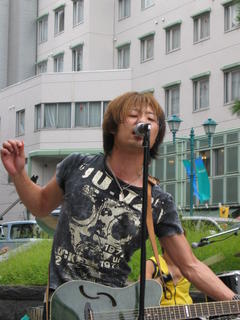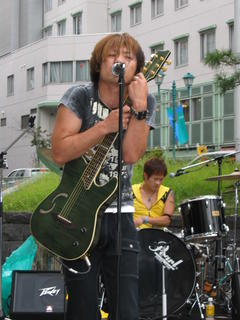(The pictures of students in this post are from our recent Sports Day: no classes, just sports contests all day. The students take it seriously and many sobbed when they lost games) left: I asked them how they would eat burgers in America if there were no chopsticks around.
left: I asked them how they would eat burgers in America if there were no chopsticks around.
It was raining and dreary when I woke up. The clouds were in a plant feeding mood and they were still and dark in the sky. The morning hike we had planned no longer seemed like fun. We did all that we could do on a rainy Sunday morning: made pancakes and did laundry. I was excited to go to a traditional Japanese drumming (taiko drumming) concert later that night and decided to relax and read amidst hanging wet bras and wrinkled collared shirts. Our friend Mike called at about 2:00 p.m. and after explaining that we had some time to kill before the concert because we had to drive out and get tickets beforehand, he asked, "So how do you guys feel about onsens?"
 left: Moemi (left) is one of my students. She sings in a rock band that's really popular in Ueda.
left: Moemi (left) is one of my students. She sings in a rock band that's really popular in Ueda.Before I explain his question, let me first explain what an onsen is. Hot spring bathhouses are called onsens in Japan. Onsens are split up so that men sit and soak on one side of the bathhouse and women sit and soak on the other side. When you go to an onsen, you leave your bathing suit behind. When Mike asked "how we feel" about onsens, he wasn't inquiring about whether or not Colleen and I like to relax in hot water, he wanted to know if we wouldn't mind if a bunch of naked Japanese people stared at our freakishly white naked bodies as we tip-toed quickly like sneaking burglars into the steaming security of hot tubs. Just to make it sound like I wasn't nervous about visiting the onsen, I quickly answered, "Oh onsens are cool, we'd be down for going to one before the concert."
 left: That's right folks, the shirt says, "Shit Son of a Bitch" The girl on the left made up the school festival shirts and said she used the compound expletive because it made people laugh. Classic example of English gone horribly wrong on a Japanese t-shirt
left: That's right folks, the shirt says, "Shit Son of a Bitch" The girl on the left made up the school festival shirts and said she used the compound expletive because it made people laugh. Classic example of English gone horribly wrong on a Japanese t-shirt By the time we pulled into the mountain top parking lot of the onsen, Mike, Colleen, our friend Lucy, and I only had 40-45 minutes to enjoy the onsen before the start of the show. We each inserted 500 yen (a little less than five dollars) into a ticket machine, took our tickets, gave them to the ticket collector, and parted ways—Mike and I to the right, the girls to the left.
Before I could even find a place to put my towel in the dressing room, Mike was naked and straddling a polished log stump seat (an onsen is his second home as he is a veteran onsen enthusiast). At that point, I got nervous. I was surrounded by naked Japanese men combing their hair and doing stretches and my only lifeline to see me through this whole process was already naked, legs spread open like a drunken football fan on the couch watching the end of the fourth quarter. I suddenly wanted to know whether or not it would be acceptable to wrap my towel around my waist and awkwardly disrobe the way I used to when I was five in the local swim club bathroom. I still remember stepping barefoot onto the cold, moist bathroom floor covered in peeling paint, shimmying out of my bathing suit with my towel wrapped around my waist, and thinking how strange it was that older men seemed so comfortable being naked around each other. I decided that if the Japanese blokes saw me do the towel thing,

they'd think I was weak in spirit or heart or something like that (every action is always an indicator of something else in Japan, you could blow your nose loudly and inadvertently comment on the work ethic of your great grandmother to every Japanese person within earshot). With Mike looking on like a mother bird first pushing her young out of the safety of the nest, I quickly dropped my boxer shorts, threw them in a cubbyhole and blurted, "What next?"
We walked out of the dressing room to a cleaning area where four shower heads and a bucket of hot water awaited us. Mike explained that because there is no chlorine in the onsen water, we must clean ourselves before we soak so we don't bring any American dirt into the onsen tubs. I used a plastic ladle to throw some hot water onto my back and chest, and after Mike washed up, we made our way past the indoor pool to the outdoor tubs. The second we left the cleaning area and walked out into the open indoor pool room, every set of eyes in the place turned toward us. While driving over to the onsen, Mike warned me and said that I should expect to be gawked at because of my white skin and tattoos. I had no idea that EVERY single person in the place would gawk and whisper at us as we walked by. I don't know why, but as we were walking through the thick, humid pool room air, I realized that I hadn't felt so out of place in years. In fact, I couldn't remember that last time I felt that out of place, that foreign. I didn't feel as though the Japanese people didn't want us there, I just felt like an oddity, like a bearded woman in a cage at the circus.
I jumped into the first opening along the pool wall that I saw and watched as Mike sat down beside me. The scene that surrounded me swamped and flooded my senses with stimuli and

made me wish I had a few more sets of eyes just to take it all in. Because the onsen facility was perched atop a mountain, the outdoor pool I was sitting in faced a deep, green, house-peppered valley surrounded by rolling, tree covered mountains. It was still a little overcast but the view was breathtaking. There was a slight breeze and thick, chilled rain drops splatted and died on my face and the top of my head and helped spice up the temperature readings my skin sent up to my brain (Legs? Whatta ya got? Well sir, still hot down here. Belly button? Yes sir, hot down here as well, no temperature change. Nipples? More of the same sir, hotter than tha arm pit of a french fry lover inna sauna, better bring on the sweat! Hmmm yes more sweat might be best…Face whatta ya think? Sir, sweat? Are you joking? I'm convinced you have a bunch of nerve dead jerkoffs working for you sir. I'm getting nothing but cold up here! It's wet and windy and the tip of Mount Nose is getting hit every other second! Please tell Skin to goose bump immediately or Mouth is gonna start to chatter!) All around me lounged naked, flushed Japanese men, small boys and girls (girls can accompany their fathers into the onsen as long as they are very young, although Mike and I saw a nine or ten year-old girl who seemed to be way too old to be in the male section of the onsen). Mike succintly stated, "If a girl can walk to school, she can walk to her side of the onsen." Some men sat in plastic chairs at the side of the pools, others laid down in submerged chairs and let the water slosh up into their wiry, thin goatees, some sat in individual wooden barrels filled with water and only the tops of their heads stuck out, as if they were about to be sealed in and thrown over Niagra, and others chatted in groups stopping conversation occasionally to take a dip in the indoor cold water pool before returning to the hot water tubs.
 left: The pool at my high school
left: The pool at my high schoolMost men carried "vanity towels"—tiny six inch by six inch towels used to cover their penises—as they walked around and chatted. I guess it's exhausting holding them all day as they walk from pool to pool because I saw a few guys with their towels draped over their heads and one very large Japanese man sat in a chair and used his towel to cover his belly. Men without towels cupped their manhood in their hands as they walked. Of all the quirky onsen customs and practices, this one was the funniest to watch. It's interesting how no one ever cares about showing his ass to the world, crack and all, but when it comes to a man showing his penis to others, he'll cup it in his hands and waddle around like an embarrassed child who "just made a pee pee" before he lets it swing in the breeze for an audience.
As I soaked, Mike made his way to each of the different types of tubs and it was amazing to watch the Japanese people stare at him as he walked. After 45 minutes, I scurried back into the changing room and put on my clothes. Just as I was leaving, I saw a naked man about to go into the indoor pool room. From knees to elbows, his skin was tattooed. I had heard of the yakuza, or Japanese mafia, before and listened as other J.E.Ts described their massive tattoos and loud motorcycles. I assumed most of the talk was over hyped gossip, but when I saw this man walk around the dressing room and watched as other men quietly moved aside to let him pass, and when I stared at the huge orange colored screaming warrior on his back, I knew he was a member of the notorious group.
Before he walked out, I approached him, pointed, and said, "Your tattoos…I like them! They're very colorful!" I didn't know what else to say. I wanted to try to ask him about his tattoos and strike up a conversation, but clearly, it was not the time or the place to do it. He smiled and nodded and walked out of the changing room. Later, as we drove down a rain slicked mountain road that resembled the spine of a scoliosis sufferer, Mike and Lucy scolded me for asking a gang member about his tattoos. When I described my encounter, Lucy smiled in disbelief from behind the wheel and looked at me using the rear view mirror, "Don't you know about yakuza? You don't talk to them! You're crazy!"
Standing there naked, tattoos and all, the man looked and ached like every other guy in the place—his face held exhaustion in the lines of his brow, he yearned to relax, and he knew an inviting, hot, tub bubbled away just beyond the changing room door.
 left: Two of my coworkers at my welcome party
left: Two of my coworkers at my welcome partyLast night Col and I attended my formal welcome party. In Japan, there are many faculty parties each year for teachers. They use the parties as a way to celebrate the arrival of new employees, the end of the year, the start of the year, the departure of old employees, and any other event deemed worthy of celebration (one teacher thanked me for coming to Japan because I gave him an excuse to drink and eat at a welcome party). Normally the parties take place at izakayas, or Japanese style bars, and involve a lot of eating and drinking. Like any other Japanese ceremonial event, the faculty parties are governed by a strict set of etiquette, and after attending two of these parties and talking to other J.E.Ts about their parties, the following rituals seem to be staples of most welcome parties:
1. When everyone enters the room people take seats around the guests of honor who sit at the middle of the table (in my case, both Natalie, the other J.E.T. at my school, and I were the guests of honor).
2. Drinks are poured and no one is allowed to take a sip before the famous kampai, or toast. During the toast, everyone holds up a glass and shouts, "Kampai!" Before the kampai, the party organizer will give a short welcome speech and say something like, "Ok, the party has now started!" or something very official sounding. Then the guests of honor will make short speeches right before the toast. At my party, each person at the table introduced himself/herself to everyone else at the table.
3. Most parties take place in private rooms and waitresses enter and exit silently as they serve

large quantities of food and alcohol to the table throughout the night. At my welcome party, there were 12 courses of food. Most of the food was seafood and vegetables but obviously the menu changes depending on where you go.
4. As you drink, others around you will continually fill your glass with more beer or sake. This is a strange practice and one that prevents you from ever knowing how much you are really drinking. After a while, it becomes quite ridiculous, especially if you are the guest of honor, because one or two people will offer to refill your glass after every other sip.
5. The parties give employees a chance to bond outside of their working environment. Conversation at the parties drifted in and out of personal topics (Oh! You and Colleen both cook!? Oh ahh! Oh you've been dating for three years?!? Ahh you're so young! Ohh ahh!!) and when my coworkers laughed more and more as the night rolled on, I finally got the sense they were being genuine and honestly laughing at things that interested them. Obviously everyone was feeling jolly because of the drinking, but it seemed as if they shed the typical polite laughs and gestures that are so frequently used in the English office.

6. No one got noticeably drunk at my welcome party although a few teachers wobbled out of Colleen's welcome party. Supposedly, no one cares if people get drunk at the parties and no one will think less of you the next day if you do. Some parties have "second rounds" and "third rounds" in which all willing party goers move the party to a bar after the formal welcome feast, and sometimes another bar after that.
7. At the end of the night, we all clapped and cheered for ourselves as a way of saying, "Yay! We partied so well!" After the clapping, another teacher gave a closing speech and declared that the party had ended. I love how structured everything is here! At Colleen's party, a teacher explained that if they all left without some sort of closing speech or clapping, it would not be "a balanced party."
8. I know what you're thinking: How much does it cost to be able to observe all of these quirky customs, eat piles of melt-in-your-mouth sushi, drink beer from a cup that never empties, and talk and laugh with my coworkers about subjects like domestic responsibilities, why "my country bombed their country," why eating without chopsticks is "just not right," and why I think a coworker should name her newborn baby Andrew Iijima even though her conservative Japanese husband surely wouldn't approve?
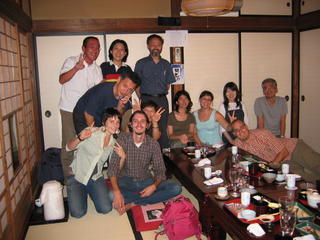
5,000 yen (or about $45)
More to come as life unfolds,
Andrew
Oh, the drumming concert was too amazing to try to describe using a medium like email that doesn't allow you to see and hear and feel the power of the massive taiko drums. If you're interested in gaining a better understanding of this ancient art form, check out Kodo, the drumming troupe I saw
http://www.kodo.or.jp/
 This past weekend I drove with three other J.E.T.s down to the Izu Peninsula for a small dose of beach camping and onsen relaxation. Leaving at 4:30 a.m. to make it down to Izu beaches before noon, Beth (my predecessor), her boyfriend Brandon, Lucy, and I piled into a small two-door car and made our way to the expressway. Toll roads in Japan are incredibly expensive, and Beth explained that the government thinks that if it makes people pay huge tolls, people will drive less and will use public transportation more. This sounds like a great idea, and I’m sure it would actually work if the government provided an affordable public transportation alternative to private commuting. In Japan, however, trains and busses are just as expensive as driving on the highway.
This past weekend I drove with three other J.E.T.s down to the Izu Peninsula for a small dose of beach camping and onsen relaxation. Leaving at 4:30 a.m. to make it down to Izu beaches before noon, Beth (my predecessor), her boyfriend Brandon, Lucy, and I piled into a small two-door car and made our way to the expressway. Toll roads in Japan are incredibly expensive, and Beth explained that the government thinks that if it makes people pay huge tolls, people will drive less and will use public transportation more. This sounds like a great idea, and I’m sure it would actually work if the government provided an affordable public transportation alternative to private commuting. In Japan, however, trains and busses are just as expensive as driving on the highway. The expensive public transportation infuriates me. I don’t understand why a Japanese public tolerates paying exorbitantly high travel expenses for BOTH public and private transportation. I’d like to think that Americans would take to the streets the day their government tried to make them pay $45 for a 2.5 hour drive on the expressway (our toll expense each way this past weekend). I wouldn’t be as angry about the pricey transportation if there was a cheaper alternative, but there isn’t. When you pay $4.60 for a gallon of gas and then have to shell out big tolls on top it, tolls that help pay for toll collectors to stand in front of tollbooth money machines to take your money and insert it in the machine for you (yes, we saw a few of these unneeded workers on our trip), it’s easy to miss a few scenic views because you’re red in the face and looking down into your ever emptying wallet every half hour.
The expensive public transportation infuriates me. I don’t understand why a Japanese public tolerates paying exorbitantly high travel expenses for BOTH public and private transportation. I’d like to think that Americans would take to the streets the day their government tried to make them pay $45 for a 2.5 hour drive on the expressway (our toll expense each way this past weekend). I wouldn’t be as angry about the pricey transportation if there was a cheaper alternative, but there isn’t. When you pay $4.60 for a gallon of gas and then have to shell out big tolls on top it, tolls that help pay for toll collectors to stand in front of tollbooth money machines to take your money and insert it in the machine for you (yes, we saw a few of these unneeded workers on our trip), it’s easy to miss a few scenic views because you’re red in the face and looking down into your ever emptying wallet every half hour. Traveling with Beth and Brandon, both J.E.T. experts as Beth is in her 4th year teaching in Japan and Brandon in his 3rd, I realized that I need to learn Hiragana and Katakana as quickly as possible if I want to get the most out of my time here in Japan. Learning these alphabets is crucial if I ever want to order my own food at a restaurant and avoid asking the waitress to pick a meal for me, get on and off highways at the right exits, and figure out fees to onsens and other attractions. It was so liberating going out for lunch on the first day of our trip and actually ordering and eating exactly what I was in the mood for—that day it was a sushi set plate with a tiny fish that was supposedly caught that morning, diced up, and served sliced on the bone. Beth and Brandon spoke and read Japanese all weekend to help Lucy and I understand different signs, sights, and menus, and it showed me what 30 minutes of studying a day while at work (Brandon’s seemingly skimpy study regimen) could help me achieve. They are both fluent in certain settings and situations—restaurants, hotels/hostels, karaoke and traditional bars, gas stations, asking directions, etc.—and can read most signs that cross their paths. I’m proud to say, after two days of studying while on the clock, I now know how to read Katakana characters! A small feat, but
Traveling with Beth and Brandon, both J.E.T. experts as Beth is in her 4th year teaching in Japan and Brandon in his 3rd, I realized that I need to learn Hiragana and Katakana as quickly as possible if I want to get the most out of my time here in Japan. Learning these alphabets is crucial if I ever want to order my own food at a restaurant and avoid asking the waitress to pick a meal for me, get on and off highways at the right exits, and figure out fees to onsens and other attractions. It was so liberating going out for lunch on the first day of our trip and actually ordering and eating exactly what I was in the mood for—that day it was a sushi set plate with a tiny fish that was supposedly caught that morning, diced up, and served sliced on the bone. Beth and Brandon spoke and read Japanese all weekend to help Lucy and I understand different signs, sights, and menus, and it showed me what 30 minutes of studying a day while at work (Brandon’s seemingly skimpy study regimen) could help me achieve. They are both fluent in certain settings and situations—restaurants, hotels/hostels, karaoke and traditional bars, gas stations, asking directions, etc.—and can read most signs that cross their paths. I’m proud to say, after two days of studying while on the clock, I now know how to read Katakana characters! A small feat, but  one nonetheless. Get ready Hiragana, I’m comin for you tomorrow and the next day and the next day, and I aint stoppin till I’ve chewed you up, digested you, and spit you out into a muddy rice field!
one nonetheless. Get ready Hiragana, I’m comin for you tomorrow and the next day and the next day, and I aint stoppin till I’ve chewed you up, digested you, and spit you out into a muddy rice field! left: The view from the onsen looking out over the ocean
left: The view from the onsen looking out over the ocean left: Brandon looking a bit stressed out
left: Brandon looking a bit stressed out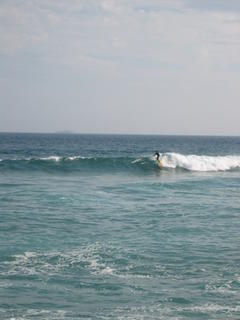
 left: A view from the walk out to the point at sunset
left: A view from the walk out to the point at sunset left: Fellow J.E.Ts Lucy, Brandon, and Beth
left: Fellow J.E.Ts Lucy, Brandon, and Beth



